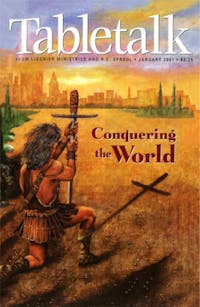
Request your free, three-month trial to Tabletalk magazine. You’ll receive the print issue monthly and gain immediate digital access to decades of archives. This trial is risk-free. No credit card required.
Try Tabletalk NowAlready receive Tabletalk magazine every month?
Verify your email address to gain unlimited access.
The word epiphany refers to a sudden and usually striking awareness or understanding of reality. It is the type of thing Archimedes experienced when he stepped into his bathtub and realized that the water he displaced was equal to the volume of his body. This discovery prompted him to run naked through the streets of ancient Syracuse crying, “Eureka! I have found it!”
I recently experienced an epiphany, not in my bathtub but in my study. Here’s what happened:
I was in a booth signing books at the Christian Booksellers Convention in July in New Orleans. A representative of the Banner of Truth Trust, a British publisher, came through the line and asked me to stop by his booth when I was finished. When I visited his booth, he handed me a book titled Evangelicals Divided by Iain H. Murray. He said, “I think you will find this interesting” (an observation that proved to be a remarkable understatement).
I read a lot of books. I am an incurable bibliophile. I cannot not read. If I’m left with nothing to read at breakfast, I will read whatever is on the cereal box. Because I read so much, it is a rare event when I find a book that yields a true epiphany. But this one did.
As soon as I finished Murray’s book, I decided to order 20 copies so I could give one to every board member of Ligonier Ministries, every member of our executive staff, and every elder of my local church. I placed the order in July, only to discover that the book would not be released until September. I didn’t realize that my gift copy was a pre-release publication, one of three copies Banner of Truth had at the time.
The book is a keen critical analysis of the history of evangelicalism in Great Britain and the United States, focusing chiefly on events within evangelicalism during the second half of the twentieth century.
Murray begins with a treatment of the thought and influence of Frederich Schleiermacher, the German theologian who was one of the chief architects of nineteenth century liberalism. He drove a wedge between Christian thinking and Christian feeling, between doctrine and experience, that left a religious heritage in which experience and feeling were everything while doctrine was a matter of indifference.
Liberalism captured the mainline institutions, both ecclesiastical and academic, of Western Europe and the United States, giving rise to the so-called “Modernist-Fundamentalist Controversy” at the beginning of the twentieth century. The fundamentalists were evangelicals who refused to negotiate the foundational doctrines of historic Christianity. They tended toward separatism and a desire to remain unspotted by the world. Westminster Seminary in Philadelphia, the result of a split by the faculty of Princeton Seminary, was content to remain small in size but enormously large in terms of long-term theological influence.
By the middle of the twentieth century, some leading evangelicals in England and the United States had become concerned about trends in fundamentalism and sought a more vibrant evangelicalism that could enter and remain within the mainstream of religious life. The creation of “neo-evangelicalism” by Harold Ockenga, Billy Graham, and key players at Fuller Seminary, plus the founding of Christianity Today, launched this new breed of evangelicals. The vision was good and the motives were righteous. However, according to Murray’s analysis, the results were disastrous, both in England and the United States.
The voices of caution from Martin Lloyd-Jones in England and Francis Schaeffer in the United Stated went largely unheeded. As a result, as evangelicals rose in number, they began to look and think more and more like Schleiermacher. During the 1990s, neo-evangelicalism moved so rapidly that it became a movement that would have been better spelled without the “e” in neo.
Murray’s critique is as kind and gracious as it is revealing and devastating. The icons of modern evangelicalism are shown as falling into egregious strategic errors that have weakened the evangelical faith at its very core. The bridges built to reach the mainstream became a two-way street by which those who sought to influence the liberals were themselves influenced.
The story of how and why this happened could serve as a wake-up call for all of us to fight with all our might against our tendency to value cultural acceptance and the power of numbers above fidelity to the truth of God. We need to read Murray’s book and read it again, because what we do today counts forever.
